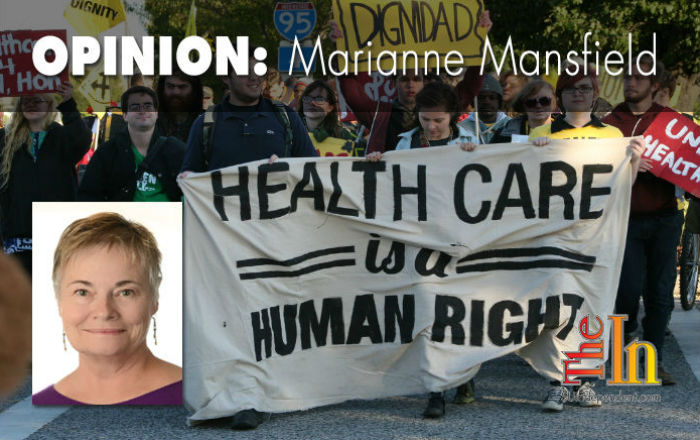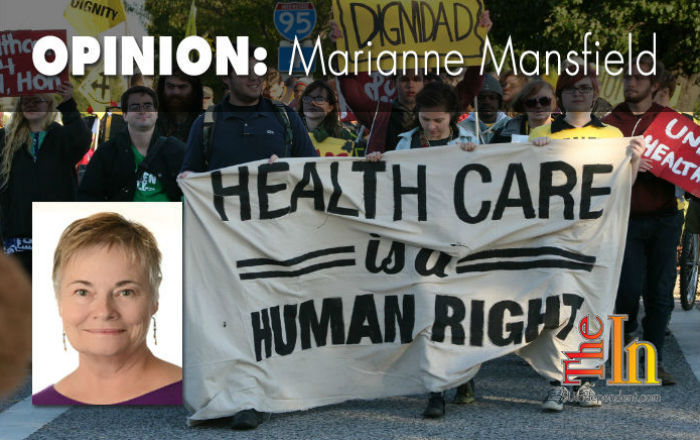
Written by Marianne Mansfield
If this isn’t the time for putting aside partisan haggling in favor of cooperation I’m not sure what is.
The case at hand is the “Healthy Utah Plan” being championed by Governor Gary Herbert, and at risk of being sabotaged by Senator Allen Christensen with his sponsorship of bill SB 153.
The sticking point appears to be the math.
I am no legislative analyst, but my take on what I have read is that there appears to be an argument between the Herbert camp and the Christensen camp over how many of the poor should be covered by the Healthy Utah Plan and at what cost. Governor
Herbert claims that his plan is both economically smart for the state and is designed to cover a significantly greater number of low income Utahns. Senator Christensen disputes both the Governor’s claims, and the numbers themselves. Christensen claims that SB 153 will address the needs of medically frail adults who are uninsured and have incomes at or below 100 percent of the federal poverty level. That is all, he contends, the state of Utah can afford without negatively impacting all other social service programs.
It isn’t easy for me to support Governor Herbert on this one, particularly when he has called the Affordable Care Act “flawed and (an) unacceptable piece of legislation.” I have been a supporter of the ACA since its inception, and continue to subscribe to the belief that we as a nation have a responsibility to care for those who are most vulnerable.
Putting aside that bias, however, I strongly support the Governor’s efforts to extend health care coverage not only to the most medically fragile adults, but also to the families of those who fall at or near the poverty line. As a former elementary principal, I saw all too often what the lack of affordable health care meant to the well-being of our students. I cannot count the times I asked, and sometimes nearly begged parents to take their obviously ill children to a medical professional. Parents’ eyes would go dull. Sometimes they would explain that such a trip wouldn’t be possible at all, or at least until ‘next month’ when they had more money available. Other parents simply chose to leave my office. The defeat they felt was evident in the slump of their shoulders. My staff and I searched high and low for resources for these families. When we did stumble upon something, it was often inadequate or so severely hampered by restrictions as to be all but unusable. It was heartbreaking.
And, to be fair, I can understand Senator Christensen wanting to put forward a bill he feels is the best our state can afford. At least I hope that is why his bill so drastically limits access to affordable health care. I am a taxpayer and I don’t want my hard earned money spent frivolously.
It is the definition of frivolous, however, that trips us up.
Children’s health is not a frivolous concern, at least not in Utah. Nor is the health of those who are poor but do not fall below the national poverty level.
Maryanne Martindale, executive director of the Alliance for a Better Utah, argues in a Feb. 11 op-ed piece for the Salt Lake Tribune that “Somewhere between 60 and 88 percent of Utahns, depending on how the question is worded, support Herbert’s plan.”
If those figures are correct then the message is clear. There is a broad base of support throughout the state for reaching the helping hand of Healthy Utah to more of our citizens than those who would fall within the coverage of SB 153.
Of course, no legislative issue by the very nature of its origin and life cycle can be free of the taint of questionable politics, and the Healthy Utah Plan is no exception. The wrangling going on in the halls of the Capital is contentious, at best. Senate Republicans met for over two hours on Tuesday, Feb. 9, but reached no consensus on how to proceed.
Moreover, newly elected House Speaker Greg Hughes last week proposed a joint closed-door session between the House and Senate Republican delegations to discuss alternatives to the Healthy Utah Plan.
This plan is spurious on any number of counts, including the lack of transparency with which we expect legislators to conduct the people’s business. Furthermore, the exclusion of the Democratic members of the House and the Senate, although a significant minority in both houses, ensures that the voices of their constituents will be unheard on the issue.
I urge our legislators to have compassion. I don’t mind paying something extra to assure that my fellow citizens have access to health care. There are basic human needs, I believe, that require us all to step up. Among those are to be fed, to be sheltered, and to be healthy. Only when those needs are met can we expect our friends and neighbors to participate with us in the life we live here. And we need them, as much as they need us today.
Marianne Mansfield has lived in Southern Utah since 2010. She and her husband followed their grandchildren to this area from Michigan. In her former life she was a public school educator. More than half of her career was spent as an elementary principal, which is why her response to most challenges is, “This isn’t my first rodeo.” She grew up in Indiana, and attended Miami of Ohio, Ball State University and Michigan State. She is a loyal MSU Spartan and Detroit Tiger baseball fan. She has been writing fiction and opinion since her retirement in 2004.




